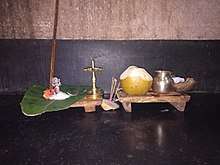Tulu Gowda
 Emblem of Tulu Gowdas. | |
| Regions with significant populations | |
|---|---|
| Dakshina Kannada, Coorg | |
| Languages | |
| Tulu, Arebhashe | |
| Religion | |
| Hinduism |
Tulu Gowda or 'Kodagu Gowda' is the name of a caste from Karnataka - India. The Gowdas mostly inhabit Dakshina Kannada and the Kodagu district. They were originally Natha Pantha and Shaivas owing allegiance to Sringeri Matha. Later, during Emperor Vishnuvardhana’s rule, they became Vaishnavites and worshiped 'Tirupati Thimmappa' (Balaji of Tirupati) and 'Sabbakka' (Sharada of Sringeri). They spoke Tulu when they came from Ikkeri later in the Haleri kingdom and settled in the Mangalore-Udupi (Dakshina Kannada-Udupi) region. They are said to have "10 Kutumba and 18 Balis" as their primordial root families, from which arose around a Nooru Mane or "hundred families." Many families settled in Kodagu from the time of Talakadu Gangas (200 - 1004 CE), under whose rule Kodagu fell. They then migrated to Coorg (Kodagu) from the Mangalore-Udupi (Dakshina Kannada-Udupi) region under the Canarese (Kannada) speaking peoples.[1]
The Gowdas were historically involved in a rebellion against British rule in Canara and Coorg. Guddemane Appayya Gowda, whose family was given lands in Kodagu, along with others from Kodagu and Kedambadi Rame Gowda from Sullia Dakshina Kannada, rebelled against the British and hoisted Jangama (Lingayite monk) Kalyanaswamy's flag in Bavuta Guide in Mangalore and ruled for 13 days.[2][3][4]
Marriages and gotras
Gowdas believe that people from the same Bali or Gotra should marry as they have originated from the same base family. However, cousin marriage between the children of a brother and sister is accepted (but not between children of two brothers or two sisters). Once married, a woman assumes the okka name of her husband. People followed the "Makkala Kattu" (Patriarchic) system of inheritance.[5]
Gowdas have 18 Bali (gotra)s, like the words "Ten families Eighteen tribe".[6] but now only 12 Baris (tribe) are present in Gowdas.
Mother tongue of Gowdas
In the present Dakshina Kannada District which includes Belthangady, Puttur & Sullia taluk Tulu is spoken. Arebhashe is spoken by The Gowdas residing at the present Sullia & Kodagu (anglicized as Coorg).
Gallery
 Emblem used by Gowda caste association
Emblem used by Gowda caste association The Gowdas worship local Tulu deities called Daiva
The Gowdas worship local Tulu deities called Daiva
References
- ↑ Dr. Kodi Kushalappa Gowda (1976). Gowda Kannada. Annamalai University.
- ↑ Karnataka / Madikeri News : Appaiah Gowda memorial to honour freedom fighter. The Hindu (2005-05-19). Retrieved on 2016-07-23.
- ↑ Account of an uprising. Deccanherald.com (2013-03-05). Retrieved on 2016-07-23.
- ↑ Fate of the insurgents. Deccanherald.com (2013-03-05). Retrieved on 2016-07-23.
- ↑ Padadhanas of Ullaklu - Bhootharadhane in Tulu
- ↑ Puttur Anantharaja Gowda (2015). "IN PURSUIT OF OUR ROOTS".